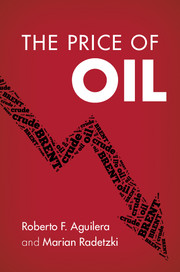Book contents
- Frontmatter
- Contents
- Figures
- Tables
- Acknowledgments
- 1 Introduction and overview
- PART I OIL'S EXTRAORDINARY PRICE HISTORY: HOW CAN IT BE EXPLAINED?
- PART II THE SHALE AND CONVENTIONAL OIL REVOLUTIONS: LOW PRICES AHEAD
- PART III GLOBAL IMPLICATIONS FOR THE MACROECONOMY, THE ENVIRONMENT AND FOR POLITICS
- 13 Impact on macroeconomy and trade balances
- 14 Climate policy with low oil prices
- 15 Political repercussions
- CONCLUSIONS
- References
- Index
14 - Climate policy with low oil prices
from PART III - GLOBAL IMPLICATIONS FOR THE MACROECONOMY, THE ENVIRONMENT AND FOR POLITICS
Published online by Cambridge University Press: 05 November 2015
- Frontmatter
- Contents
- Figures
- Tables
- Acknowledgments
- 1 Introduction and overview
- PART I OIL'S EXTRAORDINARY PRICE HISTORY: HOW CAN IT BE EXPLAINED?
- PART II THE SHALE AND CONVENTIONAL OIL REVOLUTIONS: LOW PRICES AHEAD
- PART III GLOBAL IMPLICATIONS FOR THE MACROECONOMY, THE ENVIRONMENT AND FOR POLITICS
- 13 Impact on macroeconomy and trade balances
- 14 Climate policy with low oil prices
- 15 Political repercussions
- CONCLUSIONS
- References
- Index
Summary
Though concerns about global warming are not the main focus of this book, we take a look in this chapter at the relationship between climate policies and the projected greater availability and lower long-term oil prices due to the shale and conventional oil revolutions. Without policy reactions to the revolutions, the use of fossil fuels will grow and extend their life expectancies in the global energy system. The price drop would give oil a major competitive advantage versus non-fossil alternatives, raising the cost to implement policies to reduce carbon emissions. A key question in this regard is: How seriously will climate policy be pursued? If the pursuit were serious, then climate policy could bring the revolutions to a grinding halt. The reality of the past years, however, seems to indicate that politicians are focusing their attention on other economic and geopolitical matters. We have doubts about the policy inactivity on climate change being reversed, and thus conclude that the revolutions are likely to proceed.
AN INHERENT CONFLICT
The global revolutions will greatly add to oil and natural gas supplies and result in falling long-term prices for both commodities. Coal will face sharpened competition from cheaper gas, resulting in a shrinking coal market and a lower coal price – though not a large drop since the price will only be indirectly pressured downwards. With no change in policy, the lowered fossil prices will yield higher demand and increased emissions over longer periods of time than what could be envisaged in the absence of the revolutions.
A deep climate policy would be one that dramatically reduces emissions from current levels in order to slow global warming. The reports of the Intergovernmental Panel on Climate Change (IPCC), which is the United Nation-sponsored scientific body studying climate change, assert that global warming will have adverse effects on water supplies, food, ecosystems, physical human health, and communities in coastal areas. A politically declared policy was thus defined as one assuring that CO2 concentrations in the atmosphere did not exceed a doubling throughout the twenty-first century – from pre-industrial 280 to 560 ppm, believed to involve a warming of some 2 degrees Celsius, though it needs underlining that the relationship between emissions and global warming is scientifically uncertain (Radetzki, 2010a).
- Type
- Chapter
- Information
- The Price of Oil , pp. 184 - 199Publisher: Cambridge University PressPrint publication year: 2015



